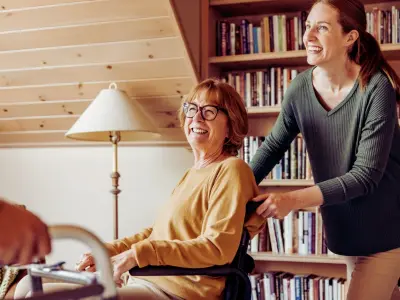Caring for elderly parents at home is a responsibility that many adult children are taking on as families prioritize keeping their loved ones in familiar environments. While this can be incredibly rewarding, it also comes with its challenges. With the right approach, tips for caring for elderly parents at home can ease the process and ensure your parents feel loved, safe, and well taken care of.
Whether you are balancing caregiving with your career or adjusting to new daily routines, the following insights will help make this journey smoother and more manageable.
Tips for caring for elderly parents at home : Our top 10
Assess their needs and your capabilities
The first step is to assess both your parents’ needs and your own capabilities. Consider their medical conditions, mobility levels, and any mental health concerns such as dementia or depression. Ask yourself how much time, energy, and resources you can realistically provide without compromising your own well-being.
Establish a safe and accessible home environment
Ensuring that your home is a safe environment is critical when implementing tips for caring for elderly parents at home. Simple modifications, such as adding grab bars in the bathroom, improving lighting, and removing tripping hazards, can significantly reduce the risk of falls. According to the CDC, falls are the leading cause of injury among seniors over 65 years old. A small investment in safety improvements can make a substantial difference.
Additionally, focus on creating a space where your parents feel comfortable and independent. Whether it’s a private room or a cozy area, maintaining their sense of dignity is key.
Develop a daily routine
A structured routine provides predictability, which can be reassuring for elderly parents. Establishing set times for meals, medications, and activities can create a sense of stability. While flexibility is important, especially on challenging days, routines help seniors know what to expect and can make caregiving more manageable.
Incorporate light exercises, reading, or social activities into their day to keep them physically and mentally active. The experts at Light Pink Care emphasize that daily routines, tailored to an individual’s abilities, significantly enhance their quality of life.
Use technology to your advantage
Modern technology offers several tools to simplify tips for caring for elderly parents at home. Medical alert systems, wearable health monitors, and smart home devices can help track your parents’ safety and health. For instance, devices that remind them to take their medications or call for help during emergencies can give you peace of mind.
Additionally, video calls and messaging apps allow seniors to stay connected with friends and family, reducing feelings of loneliness and isolation.
Take care of their medical needs
One of the most critical tips for caring for elderly parents at home is understanding and managing their medical care. Schedule regular checkups, monitor medications, and stay informed about their conditions. If their healthcare needs are complex, you may want to consult with home healthcare professionals for support.
Ensure you keep a list of medications, dosages, and emergency contacts readily accessible. A medical binder or digital app can help you stay organized and provide vital information during appointments.
Communicate openly and compassionately
Open and compassionate communication is the backbone of successful caregiving. Talk to your parents about their needs, preferences, and concerns. Include them in decisions about their care to ensure they feel respected and heard.
If you are struggling to find common ground, don’t hesitate to seek guidance. Research shows that seniors who actively engage in their care have better outcomes and are more satisfied with the support they receive.
Plan for respite care and self-care
One of the most overlooked tips for caring for elderly parents at home is prioritizing the caregiver’s well-being. Caregiver burnout is a real risk, so it’s essential to take regular breaks. Respite care, which involves temporary professional support, can provide you with time to rest and recharge.
Self-care isn’t selfish—it’s necessary to provide the best care possible. Whether it’s enjoying hobbies, exercising, or seeking counseling, taking care of your mental and physical health is vital.
Involve family members and friends
Caring for elderly parents doesn’t have to be a solo effort. Enlist the support of siblings, extended family, and friends. Sharing responsibilities can prevent caregiver fatigue and ensure your parents’ needs are met.
You can divide tasks such as grocery shopping, attending appointments, or simply spending quality time with your parents. Coordination apps can help family members stay organized and informed.
Provide emotional support and social interaction
Loneliness can be detrimental to the emotional and physical health of elderly parents. One of the best tips for caring for elderly parents at home is ensuring they have regular social interactions. Encourage visits from friends, participate in community events, or explore senior groups in your area.
If mobility is an issue, online groups or virtual gatherings can be great alternatives. According to the National Institute on Aging, social connections help prevent cognitive decline and improve emotional well-being.
Educate yourself and seek professional help when needed
Educating yourself about aging-related issues will prepare you to handle challenges effectively. Understanding topics like dementia, arthritis, or nutrition for seniors will make caregiving less overwhelming.
If you find yourself feeling unprepared, seek professional help. Home healthcare aides, nurses, or geriatric care managers can provide expert support. Trusted resources like the National Council on Aging offer a wealth of information to guide you.
Final thoughts
Caring for elderly parents at home requires patience, compassion, and a well-thought-out approach. By following these tips for caring for elderly parents at home, you can provide your loved ones with the comfort, care, and dignity they deserve. From creating safe spaces to ensuring their emotional well-being, each tip contributes to a holistic caregiving experience.
Whether you are just beginning this path or have been caring for your parents for years, embracing these strategies will empower you to face challenges with confidence and love.
By equipping yourself with knowledge and seeking help when necessary, you can navigate the rewarding experience of caring for your elderly parents with grace and ease.
FAQ Tips for caring for elderly parents at home
How to talk to parents who won’t listen?
When elderly parents are resistant to advice or support, focus on listening first. Acknowledge their feelings and avoid being confrontational. Frame suggestions as collaborative ideas rather than directives. For example, instead of saying, you have to do this, try, how about we try this together? Patience and compromise often go a long way in these situations.
What not to say to elderly parents?
Avoid phrases that undermine their dignity or independence, such as you can’t do that anymore or you’re being difficult. Instead, approach conversations with respect and understanding. For example, instead of I know what’s best for you, try, let’s figure out what works best for both of us. Language matters, so choose words that empower rather than criticize.
How to emotionally deal with aging parents?
Emotionally supporting aging parents involves patience, empathy, and acceptance of their limitations. Focus on open communication, validate their feelings, and acknowledge the emotional challenges they’re experiencing. Seeking counseling or joining a caregiver support group can help you process the complex emotions that arise when caring for elderly loved ones.
How do you stay sane while caring for an elderly parent?
Staying emotionally balanced while caregiving requires setting boundaries and seeking support. Take regular breaks, practice mindfulness techniques, and lean on family or professional respite services to avoid burnout. Caregivers who engage in self-care—whether through hobbies, counseling, or physical activities—are better equipped to handle the demands of daily care.

